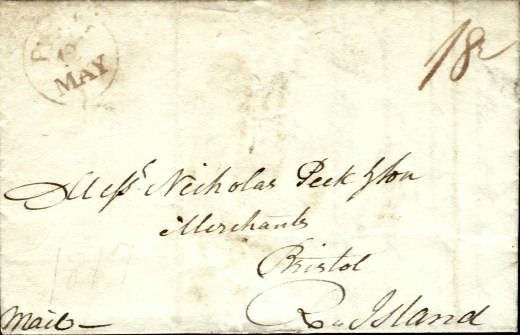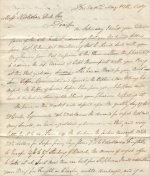![]()
Postal History Introduction
Stampless
Covers
1846
to 1900 Issues
1901-1950
Issues
1951-2003
Issues
Cancels
&
Miscellaneous
Postal
Stationery
Post
Cards
Air
Mail
First
Day &
Event Covers
Parcel Post/Special Delivery
Registered & Official Mail
Commercial & Advertising
Revenue & Postage Due
Wildlife & Game Issues
Complete List of RI Issues
|
Rhode Island Stampless
Covers & Letters |
|||||||||||||||||||
|
|||||||||||||||||||
|
181/2 Cent Rate Marking with "PHIL 12 MAY" Town Cancel |
|||||||||||||||||||
|
The Town Postmark is the 1816 to 1834 type of Philadelphia cancel in Red-Brown and has "PHIL" in an arc at top with day and Month below. The rate of 181/2 cents is the correct rate for a single sheet letter weighing less than one ounce and traveling a distance between 150 and 300 miles, (Philadelphia to Bristol, RI). The rate was set by the Postal Act of April 9, 1816 and became effective on May 1, 1816. This zone rate was changed by the Postal Act of March 3, 1825 to 183/4 cents which was in effect until July 1, 1845. The letter from Mr. Maybin informs Msrs Peck and Son that their brig Francis arrived safely and discusses the cargo of coffee and Lignum Vitae and logwood The letter also discusses prices for other types of cargo and the small chances of getting another charter or freight for the ship. Mr. Nicholas Peck and Son were Bristol, RI shipping merchants and their cargos included lumber, grain, molasses, nails, produce, rum, and tobacco. They were also involved in the Slave Trade. |
|||||||||||||||||||
NOTE:
In the early 19th century,
Lignum Vitae was used to treat tropical diseases. It was also
popular as a treatment for syphilis, rheumatoid arthritis,
respiratory problems, skin disorders, and gout. It was used in
cough medicine, as a local anesthetic and as a help for herpes.
In short - it seems to have been used as a cure-all for quite a
few common ills of the day. Nicholas Peck and Son, were partners in several joint ventures with other Rhode Island merchants, including John Brown (of the Providence Browns) and Charles Collins, (Brown and Collins were also in the slave trade). Nicholas Peck had a reputation for sending unseaworthy craft to sea. One of his ship's masters, Nathaniel Gladding told Nicholas, "It would have been a hundred or two dollars in your pocket if you could believe those who had experience of the sea knew as much about them as yourself, but tis a distemper I despair your ever being cured of." Nicholas was married to three wives; Elizabeth Smith, Jemima Gorham, and her sister Sally Gorham. He had three sons, John, Nicholas Jr., and Viets. Nicholas Peck died in 1847. |
|||||||||||||||||||

RI Historical
Society
Introduction
Stampless I
Stampless II
Stampless III
Stampless IV
Stampless V
Stampless VI
Brown & Ives Letters
The Hazard Family Letters
Joseph Tillinghast
Free Franked Letters
DeWolf Family Letters
Recently Added Pages

